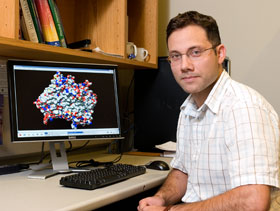  |
| HOME | THIS ISSUE | CALENDAR | GRANTS | BACK ISSUES | < BACK | NEXT > |
Chemistry professor’s research crosses scientific disciplinesby Cindy Weiss - September 11, 2006 |
||||
| Jose A. Gascón, a new assistant professor of chemistry in the College of Liberal Arts and Sciences, has received a prestigious New Faculty Award from the Camille and Henry Dreyfus Foundation, New York City. It is the first such award to a UConn faculty member. The $50,000, five-year award, one of only 12 in the country, will be used to further his research on the quantum mechanical nature of chemical and physical phenomena that occur in proteins and enzymes at the molecular level. Gascón, a physical chemist, joined UConn this fall from Yale University, where he was a postdoctoral fellow. He characterizes his work as biochemistry with a theoretical or computation spin. He works at the interfaces of chemistry, physics, and biology. "The interfaces are diffuse," he says. "Sometimes what I do could be considered biophysics." Like fellow chemistry faculty member Robert Birge, whose work also crosses the boundaries of scientific disciplines, Gascón is interested in the protein rhodopsin, present in the retina of the eye, which traps light and contributes to vision. Gascón also is interested in the study of enzymes that contain vanadium, a chemical element abundant in marine life. Vanadium-containing complexes have shown potential for use in diabetes therapy. His main research tool is using a hybrid method that combines quantum mechanics and molecular mechanics, or QM/MM, to compute and describe the interactions of atoms in the protein. But he looks for new tools and methods to improve the description, and in collaboration with others has come up with a new method, called Moving Domain QM/MM. It takes into account polarization phenomena, which means that the molecular charges within the protein are able to change according to their environment. The method is practical, he says, because it is characterized by linear scaling, which results in computational efficiency. The computations involved in his research are complex, and Gascón has time grants to work at two major super-computing centers, in Pittsburgh and California.
Gascón's work has many applications, from improving the understanding of the chemical reactions going on inside the protein, to drug design, such as designing a molecule to interact with and inhibit the enzyme of a disease-causing protein. He was nominated for the Dreyfus award by his new department head, Steven L. Suib, Board of Trustees Distinguished Professor of Chemistry. "Dr. Gascón has an impressive research record and deserves the recognition of this prestigious award," says Suib. "Such awards are rare and we are truly fortunate to have Dr. Gascón join our faculty." Gascón, a native of Villa Maria in the Córdoba province in central Argentina, started out majoring in physics as an undergraduate in Argentina. He earned a Ph.D. in chemistry at Louisiana State University and then became interested in applying physical chemistry to biological problems, which he began working on at Yale. At UConn, he hopes to interact with materials and polymer researchers, inorganic chemists, and "wherever there's a problem that requires molecular detail." His wife, Fabiana Cardetti, an assistant professor of mathematics, joined the UConn faculty last year after a two-year postdoctoral fellowship. They are from the same province of Argentina, and attended graduate school together at LSU. Gascón is happy that they can once more meet for lunch. He is also excited about the resources at UConn. When Gascón was at Yale, he followed Birge's work. "Being a few offices away from him is an honor," he says. "This is a great school," he says, "and this building (chemistry) is one of the best chemistry facilities in the U.S." The Camille and Henry Dreyfus Foundation New Faculty Awards Program provides funding for new faculty members in chemistry, biochemistry or chemical engineering at the start of their research and teaching activities. Awards are made based on the nominee's potential to produce an independent body of scientific scholarship of outstanding quality and to make significant contributions to overall education in the chemical sciences. This semester, in addition to his research, Gascón is teaching physical chemistry for undergraduates in their senior year. |
| ADVANCE HOME UCONN HOME |

